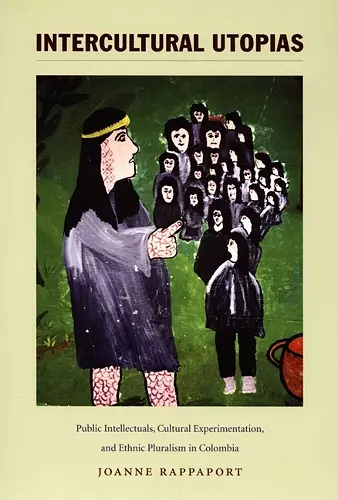Intercultural Utopias
Public Intellectuals, Cultural Experimentation, and Ethnic Pluralism in Colombia
Format:Paperback
Publisher:Duke University Press
Published:20th Sep '05
Currently unavailable, and unfortunately no date known when it will be back

Explores how participants in the indigenous movement in Cauca, Colombia - including indigenous, non-indigenous, scholars, and shamans - have helped define a new sense of Colombian nationhood
Although only 2 percent of Colombia’s population identifies as indigenous, that figure belies the significance of the country’s indigenous movement. More than a quarter of the Colombian national territory belongs to indigenous groups, and 80 percent of the country’s mineral resources are located in native-owned lands. In this innovative ethnography, Joanne Rappaport draws on research she has conducted in Colombia over the past decade—and particularly on her collaborations with activists—to explore the country’s multifaceted indigenous movement, which, after almost 35 years, continues to press for rights to live as indigenous people in a pluralistic society that recognizes them as citizens. Focusing on the intellectuals involved in the movement, Rappaport traces the development of a distinctly indigenous modernity in Latin America—one that defies common stereotypes of separatism or a romantic return to the past. As she reveals, this emerging form of modernity is characterized by interethnic communication and the reframing of selectively appropriated Western research methodologies within indigenous philosophical frameworks.
Intercultural Utopias centers on southwestern Colombia’s Cauca region, a culturally and linguistically heterogeneous area well known for its history of indigenous mobilization and its pluralist approach to ethnic politics. Rappaport interweaves the stories of individuals with an analysis of the history of the Regional Indigenous Council of Cauca and other indigenous organizations. She presents insights into the movement and the intercultural relationships that characterize it from the varying perspectives of regional indigenous activists, nonindigenous urban intellectuals dedicated to the fight for indigenous rights, anthropologists, local teachers, shamans, and native politicians.
“Joanne Rappaport takes engaged anthropology a whole step further in this brilliant experimental ethnography. Through intercultural dialogues involving new generations of Nasa intellectuals and their nonindigenous collaborators in Colombia, we witness creative tactics to decolonize knowledge and produce novel hybrid political culture. Intercultural Utopias offers a rigorous, indigenously inflected analytical approach to issues such as indigenous politics, autonomy, and conflict ‘inside the inside’ of highly fluid arenas of indigenous activism.”—Kay Warren, author of Indigenous Movements and Their Critics: Pan-Maya Activism in Guatemala
“This book is a major intervention in discussions of interculturalism among scholars and activists committed to indigenous movements. Joanne Rappaport’s theoretical and methodological innovation and politically engaged practice model the transformative power of horizontal conversation between and among intellectuals from distinct linguistic and cultural traditions.”—Florencia E. Mallon, author of Courage Tastes of Blood: The Mapuche Community of Nicolás Ailío and the Chilean State, 1906–2001
“Intercultural Utopias is extremely useful for thinking comparatively about indigenous movements, particularly the sections on bilingual education, the role of the national left, implementation of customary law, and dealings with transnational religious authorities.” -- Diane Nelson * Journal of Anthropological Research *
“In this path-breaking book, Rappaport describes and analyzes the work of ‘intellectuals’ that have during recent decades informed and shaped the indigenous movement in the province of Cauca (Colombia). . . . One of the book’s major insights is its challenge to the idea that Colombia’s indigenous movement is monolithic, with a homogenous set of actors.” -- Esteban Rozo * Comparative Studies in Society and History *
ISBN: 9780822335993
Dimensions: unknown
Weight: 517g
360 pages